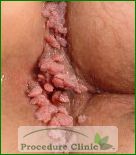For the complete information on anal warts, please review the website
hemorrhoidheal.com
Anal warts are growths found around the anus, in the anal canal, or in the lower rectum. Anal warts are caused by the human papilloma virus, which is usually transmitted through sexual contact but not always through anal intercourse. These may also occur on the penis, scrotum, vagina or labia. It usually takes one to six months, but sometimes longer, for the warts to appear after being exposed to the virus. There are many types of human papilloma virus—some cause warts on the hands and feet while other types cause genital and anal warts.
There are often no symptoms at all. Sometimes there may be small growths in the anal area or minor itching, bleeding, or moisture in the anal area.
Your doctor will inspect the skin around the anus and check the anal canal in order to make a diagnosis.
The treatment depends on the location, number, and size of the warts. Small warts can be treated with podophyllin or bichloracetic acid, applied directly to the warts to exfoliate them for a few minutes. Another way is through cauterization, where the area is numbed with local anesthesia before the warts are burned off. If there are many warts, you may need to surgically remove them. Dr. Shu often uses the radio frequency device to shave the warts off.
FAQ
Can the procedure be done in the doctor’s office?
Yes, anal wart removal can be performed in the comfort of the office under local anesthesia. It takes 10 minutes. We perform less invasive surgeries using a radio frequency equipment.
Does it hurt? Any risks?
Pain is typically mild, and patients should alternate warm sitz baths with ice packs to reduce discomfort. Antibiotics may be prescribed as a precautionary measure against infection. The common surgical complications include the infection and bleeding.
Will anal warts come back?
Recurring anal warts may occur.
Will a single treatment cure anal warts?
No, a single treatment usually does not cure anal warts. The virus may stay and cause new anal warts to form even if none are visible, so it’s important to do close follow-ups for up to six months. Small warts that reappear can easily be treated in the office. If the new warts are not treated, there could be serious problems, such as the warts becoming cancerous.
How can the spread of anal warts be prevented?
Here are some ways to prevent the virus from spreading:
- Sexual partners should be checked.
- Refrain from sexual activity until treatment is completed.
- Use condoms.
For the complete information on anal warts, please review the website
hemorrhoidheal.com





